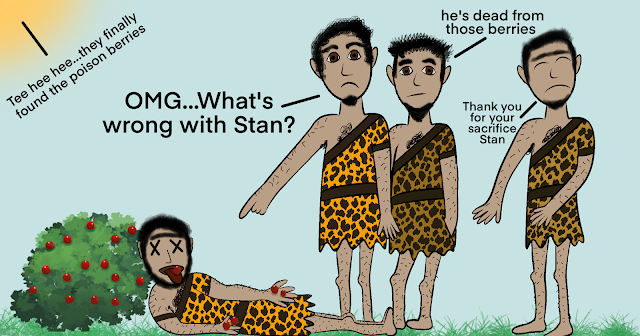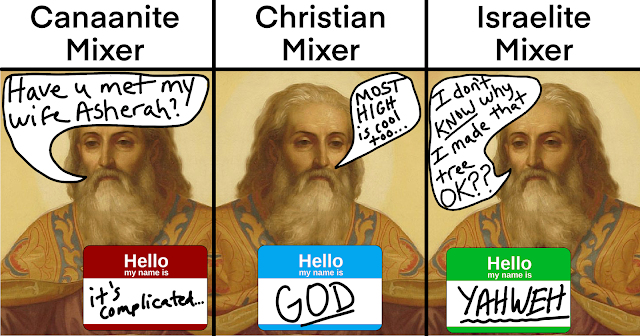How Famines and Poison Berries Demonstrate a Non-existent (or Uncaring) God
Many people often gush about how the Christian God has blessed their lives. He has provided food, shelter, medicine, and the joys of life. People pray before meals, thanking God for his generosity and for the food on their plate. Everything good is from God.
There are many Bible verses that back this up, too.
- "And God is able to bless you abundantly, so that in all things at all times, having all that you need, you will abound in every good work." 2 Corinthians 9:8
- "Consider the ravens: They do not sow or reap, they have no storeroom or barn; yet God feeds them. And how much more valuable you are than birds!" Luke 12:24
- "So do not worry, saying, ‘What shall we eat?’ or ‘What shall we drink?’ or ‘What shall we wear?’" Matthew 6:31
- "Everything that lives and moves about will be food for you. Just as I gave you the green plants, I now give you everything." Genesis 9:3
But have they ever stopped to think -- for just a moment -- about whether God has actually held up his end of the bargain?
Does everyone really have enough food?
According to the UN, "Each day, 25,000 people, including more than 10,000 children, die from hunger and related causes. Some 854 million people worldwide are estimated to be undernourished, and high food prices may drive another 100 million into poverty and hunger."
Over the course of recordable humanity, there have been countless numbers of famines. This Wikipedia page shows the years, locations, causes, and death tolls from each famine.
From 1850–1873, 60 million people starved to death in China.
There is currently a famine in Yemen, where 85,000 children have died since 2016.
If you want to read something really horrible, just read about the Kanki famine.
Does this line up with the claim that God is a generous provider? Does God give us all we need? Have we all been blessed abundantly? Christian apologists may point out that most of these famines happened in non-Christian countries -- perhaps as punishment for not worshipping him? Putting aside the fact that no loving God would inflict starvation as punishment on people for never even hearing about him...but the argument itself doesn't hold up, because there was a famine in Judea in 26 BCE where 20,000+ people died as recorded by Josephus.
So God has even starved his own people. Not only that, he's got a track record in the Bible for getting mad when people ask for food (see Numbers 21:6): "'Why have you led us up out of Egypt to die in the wilderness? There is no bread or water, and we detest this wretched food!' So the LORD sent venomous snakes among the people, and many of the Israelites were bitten and died."
God allegedly designed us with specific and unrelenting biological needs. As our alleged designer, he clearly KNOWS what those needs are, yet has provided a world for us that HAS FAILED over and over again to meet those needs.
If a kid buys a cage full of gerbils, and purposefully only feeds them enough for half of the gerbils to survive -- is that loving or is that cruel?
Does God make burritos?
If someone thanks God for the burrito on their plate, the implication is that God had a hand in making or sourcing that burrito. Does that idea hold up?
The beans and rice in the burrito are a direct result of agriculture. Although the timeline is a bit fuzzy, humans began farming roughly 12,000-23,000 years ago. That means there was a farmless period of a few hundred thousand years before humans finally developed agriculture. There is no evidence that it was the result of divine intervention.
If God HAD suddenly zapped down some agricultural knowledge 12,000 years ago, that means he held back on the prior 200,000-300,000 years of humanity who would have benefitted from that knowledge. So what's more likely? Humans discovered farming on their own, or God decided one day to clue them in on a little secret?
What about actually cooking the food? The appliances used to cook were humans inventions. The electricity was harnessed by human ingenuity. None of those inventors credited divine inspiration. In fact, the development of electric appliances is very well documented and Yahweh wasn't on any of the patent papers.
Were the actual ingredients given to us by God? Were the lettuce, rice, and bean plants part of the "green plants" referred to in Genesis 9?
Nope again. All our domesticated plants were created by humans from wild relatives. According to NPH Online:
"The differences between domesticated crops and wild relatives can be attributed to human-mediated selection (the “artificial selection” described by Darwin). Humans took seeds from wild plants and grew them close to their homes, and the very early farmers observed that some plants had more favorable characteristics than others, such as better-tasting or more numerous or retained seeds, or were easier to grow, or were more vigorous. Early farmers collected the seeds of the best plants to grow the next year, and this domestication process happened year after year, generation after generation, until the nature of the plant was changed."
If God didn't give us the plants or teach us how to grow them, then what exactly DID he do?
But was it divine inspiration?
Some could claim that divine inspiration was the driving force behind these human advances. Here's the problem with that assertion: it is indistinguishable from there being no divine inspiration at all.
In fact, I could credit a milk jug with inspiring these things, and there would be just as much evidence for that as for the Christian God.
We also have no proof that divine inspiration is even possible. It's never been demonstrated. The Bible is sometimes claimed to be divinely inspired, but that is not supported by evidence.
Why add an extra layer onto reality when it works just fine by itself? In other words, humans clearly invented and developed these things naturally over the course of thousands of years. It was not slowly leaked to us by an alleged God.
Besides, if these things WERE divinely inspired, then that means God sat by and did nothing while watching early humans struggle for hundreds and thousands of years as hunter gatherers, starving to death, lives full of suffering and confusion. At one point, God got tired of watching this, so he decided to inspire agriculture?
The poison berries
First of all, why do we even HAVE poison berries? According to the Biblical narrative, "Everything that lives and moves about will be food for you. Just as I gave you the green plants, I now give you everything."
So where do poisonous foods fit into that? What is the point of berries that can kill people and animals? It makes sense in a world where the organisms best-suited to their environment survive. It doesn't make sense in a world that God created for us where humans are the focus.
And God never explained which foods were poisonous.
Meaning humans had to discover by trial and error which foods were poisonous...by eating them...and promptly dying.
So God supposedly loves us, made all the plants for us to eat, snuck some deadly plants in there, and just let us sort out which ones will kill us on our own. All while lovingly watching over us.
That doesn't track. A loving God who cares for all our needs would have either not created the poisonous berries, or would have kindly informed the humans which ones were deadly...like in an instruction manual or something.
Expand your bubble
Evaluate the claims of the Bible against reality. Do humans really have all that they need in all times? Does God really care for us more than the birds?
As someone thanks God for giving them a burrito, they are ignoring the fact that God allowed 10,000 kids to starve that day from lack of food.
Step outside the bubble in which all you can see is what pertains to you. Expand your view to all of humanity, not just your own life. Does it seem right that God has blessed some people with more than enough food, and others with not even enough to survive?
No, it's not right. It's not the actions of a loving, omnipotent God, but Christians never seem to question why people don't have enough food. They KNOW that other people starve, and they ALSO claim that God has blessed them. They isolate these two facts in separate parts of their brains, never the two shall meet. This is cognitive dissonance.
Expand your bubble. God has not lived up to the promises in the Bible.
Either he is not omnipotent, all-knowing, and all-loving, or he does not exist.
Related Post: If God doesn't value human life, why should we?
References:
- https://www.npr.org/sections/thesalt/2016/07/15/485722228/where-did-agriculture-begin-oh-boy-its-complicated
- https://www.sciencedaily.com/releases/2015/07/150722144709.htm
Thanks to Phil Q for his help with this post! Please go check out his blog at https://philqmusings.wordpress.com.





Comments
Post a Comment
Please leave a respectful and kind comment.